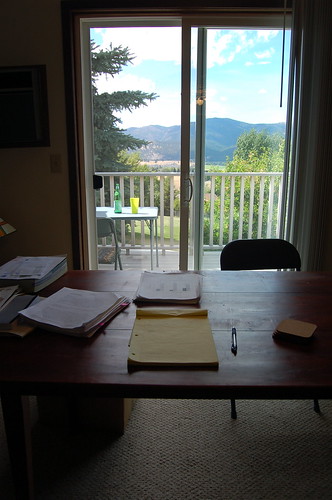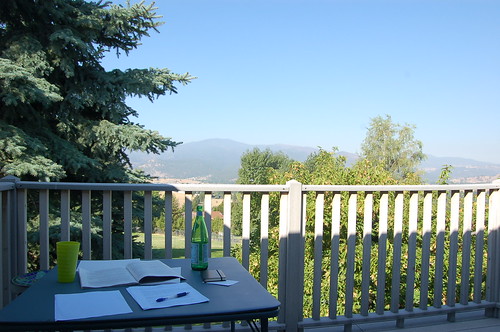I was standing on the deck in my bathrobe, throwing rocks at a cat, when I realized I was standing on the deck in my bathrobe, throwing rocks at a cat. I paused as I was about to launch the third one, but the cat had disappeared behind the pine tree. I piled the leftover rocks on the railing and retired indoors. I had been sitting at the table, trying to read The Missoulian, when Zuzu had made the discovery that there are other cats in Montana, after all. Her ongoing observations through the sliding-glass door, the window behind the couch, and window in my office had so far reassured her that, however unpleasant the move from Baltimore had been, at least we had left all other cats in the world behind. But suddenly, in the gray light of dawn, here was another cat, white-socked and arrogant, just standing down there on the grass and looking blandly up at the window while Zuzu – unable to abide the thought that she is not the sole representative of her species on this earth – huffed and growled her displeasure.
At first this was funny. It always is. How unfortunate it is for cats that their expression of utmost, deepest anger sounds essentially ridiculous to human ears (not to mention that the little mewing sounds they make for attention sound like the brattiest imaginable whining noise, so that while they are telling you they wish you could all spend a little more quality time together, you are trying to remember where you put the drowning sack).
But it got old. It always does. I kept shooing Zuzu off of the back of the couch, hoping to divert her attention, but she kept bounding back up, back arched eight inches above her head, otherworldly wails issuing from her mouth.
I realized the only way I was going to get any peace, so that I could continue reading the front-page article about local city-council candidates being forced to perform the chicken dance at a local pre-election event “aimed at [the] younger generation” (aren’t you old folks jealous?), would be to temporarily take up arms in Zuzu’s name. I went out the front door in my bathrobe and gathered some of the “river rocks” that the condo association keeps stocked in the flower beds next to each unit’s driveway and walked back through the house and out onto the deck. The cat was still standing next to a fence a few units down and looked curiously up at me. Zuzu had followed me to the sliding-glass door. Kill it! Kiiiillllll it! she wailed, or noises to that effect. What had I gotten myself into, I wondered, my hand shaking, sweat beading on my brow. Was this really the right thing to do? Or was Zuzu manipulating me to do her evil bidding?
I picked out my first rock and raised my arm. As soon as I did, the cat took off running. (Someone must have thrown rocks at him before.) It wouldn’t be long before the cat would reach the cover of the large pine tree out behind the units, but I had lost my stomach for grim violence so early in the morning, and so my throw was halfhearted and half calculated to miss. My second rock also went wide, and I cannot say I was sorry, although Zuzu looked at me suspiciously as I reentered, as if wondering just how committed I really was to the cause.
I ignored her, sat back down at the table, and turned to an article about hunters reloading their own ammunition (i.e., they pick up their old shell casings, buy new bullets, i.e., the little thing that actually gets fired out of the barrel, and then repack the shell with powder), which apparently saves them quite a lot of money, in addition to letting them customize how much powder is in each shell in order to, say, reduce wear and tear on the barrel of an antique rifle, or increase the striking power for large game, and so on. The headline was “Adding Life to Bullets.” I take this as yet another sign that we really are in gun country. Other signs spotted so far include:
- The fellow we met on the Canyon Falls trail near Hamilton a few weekends back, striding along with his kids (excited four-year-old boy clutching a small container of water that, from the way he handled it and gazed into it, probably contained some specimen of the local fauna that he had scooped from the creek; excited eight-year-old boy dragging several massive branches behind him; and tragically bored twelve-year-old girl bringing up the rear, listening to an iPod), wearing a large, silver revolver in a black nylon shoulder holster. I asked one of our hiking companions – not a local, but someone who has lived here for a while – if this was, strictly speaking, legal. She shrugged and said, “as long as it’s not concealed.” I offered that the Forest Service, whose land we were on, might have a different opinion. She told me that “gun laws in Montana are mostly theoretical.”
- The sign at the front door of Sportsman’s Warehouse, a huge sporting-goods (a term which, in these parts, heavily implicates hunting) store in one of the Reserve Street strip malls: “If you plan to remove your handgun from the holster while in the store, ensure that it is unloaded and the breech open before entering.” (Is it my imagination, or do I hear something of an implied threat behind those words, sort of similar to the way the gunner’s mates at the Coast Guard shooting ranges – their fingers lightly caressing the butts of the sidearms they habitually wore – sternly advised us not to turn from our firing lanes with an unholstered weapon in hand?) Meanwhile, back behind Sportsman’s Warehouse’s gun counter, veritable acres of wall space were given over to row upon row of handguns hanging from hooks, easily several hundred of the things in view, in dozens of shapes, varieties, and colors.
- The full-color ads in the daily paper, touting rifles, handguns, and ammo. Only today, I noted that a “great junior or women’s rifle” was available from a local outfitter for only $319, while apparently a basic Remington twelve
guagegauagegauge (WHY can I never remember how to spell that word?!) can be had in these parts for around $250.
Later in the day, I spent an inordinate amount of time trying to get Gmail to let me choose between two different “signatures” (the little block of information, usually containing one’s title, email address, phone number, etc., that appears automatically at the bottom of a new email you are composing). Why, you might ask, do I need two different signatures? Because a client of mine would like me to use an email address based on her business’s internet domain when I do work on her behalf, so that, essentially, I will look like an employee of hers when I email her clients.
But I didn’t want to have to check a second email account, worried that I might forget and therefore miss some essential message. (Also I am just lazy.) So I had this client set up my account (which we’ll call “me@GenericBusiness.com”) to forward to my Gmail account (which we’ll call “me@gmail.com”). This meant that any message sent to my GenericBusiness.com address would show up in my Gmail inbox, where I would be guaranteed not to miss it, since I check my Gmail inbox approximately every thirty seconds throughout the day.
Next, I was able to set up Gmail so that I could respond to these messages as “me@GenericBusiness.com” as well (as opposed to “me@gmail.com,” the usual return address). The basic framework of what I needed was now in place. The problem was that I also wanted a different signature for each account, so that, (1) when I send a message as “me@gmail.com,” the signature block will include my personal contact info and web site, but (2) when I send a message as “me@GenericBusiness.com,” the signature block would include GenericBusiness.com’s contact info and web site. Strangely, Gmail does not offer this option; as far as they are concerned, the only way to use more than one signature would be to type or paste them in each time I compose a message. (I guess they’re too busy planning to colonize the moon to come up with useful features like this.
But since I use Firefox’s web-browsing software, and since Google’s products are “open source,” meaning that they publish the nuts and bolts of how these products work, meaning in turn that thousands of geeky computer types can create add-ons and modifications to these products, I was able to add what’s called a “script” that changes how the Gmail web site behaves for my email account. First I had to add the Firefox script manager, Greasemonkey. Then, via Lifehacker, a wonderful blog that covers “tips and downloads for getting things done,” I found the “Multiple Signatures in Gmail” script written by a developer who goes by the on-line moniker of “Choonkeat.” This was easy enough to install – like any of these add-ons, you just click on a link – but, because it had to generate my specific signatures, I did have to open the script (sort of similar to the source code of a web site) and insert my signature information, which was extremely frustrating until I realized that you cannot use an apostrophe in the text of your signature, since whatever scripting language is in use reads apostrophes as programming language, not text, and it bollocks up the whole process. After an embarrassingly long time, however, I finally figured it all out, and now I can easily switch identities and signatures within my Gmail webmail browser window.
So I was definitely ready for a Pabst Blue Ribbon (ah, Natty Boh, how I miss you) and episode two of this season of “The Office,” still essentially the only television show A. and I make any effort to watch. (I mean, I’ll turn on “Family Guy” from time to time, but if the baby or the dog are too long coming on-screen, I tend to get bored. And we can’t seem to adjust to tuning in “The Simpsons” at seven p.m., which is when it comes on out here in the hinterland if you can believe it. But on a related note, one could easily get into watching the various “Late Shows” out here, because they all start around ten p.m. I mean, I haven’t gotten into it, but one could.) Two of A.’s Bird Camp colleagues joined us. Really, the only reason A. stopped and bought PBR on the way home was because one of these colleagues is known to prefer “cheap beer,” so it was like something out of O. Henry’s “Gift of the Magi” when they turned up with a six-pack of a local microbrew, purchased only “because A. likes fancy beer.”
Anyway, “The Office” was good, although I wonder if they are overdoing it with these hour-long episodes. As short as the show used to seem, the hour-long ones can feel a little indulgent, and the rhythm and pace seems to fizzle after a while. Don’t get me wrong, the show is still top notch, and it’s not like I wasn’t happy to look at the clock at eight thirty and see that there was still another half hour to go. I wouldn’t say that the show is currently at the peak of its comedic powers, but the writers seem to me to be doing a good job maneuvering the extremely tricky point they are at in the overall story arc and the various characters’ development (i.e., the Jim-and-Pam romance, which, if mishandled, could really easily turn the show maudlin and pointless).
No word from my parents, who I think should have reached their hotel near Glacier National Park last night. We join them Saturday, in preparation for which I have been brushing up on my bear-fighting techniques. I might even buy some pepper spray today. I really don’t think I’m being paranoid, but I’ll put off briefing you on local ursine news until tomorrow.




